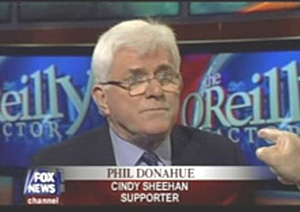 |
 |
 |
 Entertainment | Books | September 2006 Entertainment | Books | September 2006  
Cable News, Hazardous to the Republic
 Jason Salzman - MinutemanMedia.org Jason Salzman - MinutemanMedia.org


| | Cohen's depressing story of the rise and fall of Phil Donahue, one of the most famous liberals in America, is only one of series of oh-my-God-what-is-happening-to-journalism stories he tells in his excellent 200-page book. |
In 2002, Phil Donahue was one of the most famous liberals in America. His TV talk show, "The Phil Donahue Show," had ended six years previously, after a 27-year run, and Donahue had used his retirement to stand up for peace, gay rights, feminism, and other issues embraced by left-leaning political advocates. As Donahue crashed around the country bashing conservative views, MSNBC was losing the ratings war to cable competitors CNN and Fox.

MSNBC executives were looking for TV talk show host who could help their flagging network beat Bill O'Reilly at his own talk show game - and do it during the same time slot.

Donahue was articulate, charismatic, and, you'd think, the perfect guy to launch a successful TV talk show - again - and walk all over O'Reilly. That's exactly what the cable network MSNBC thought when they put Donahue on the air in July 2002. MSNBC's Donahue initially matched Fox, but its ratings quickly began to slide and, in less than eight months, MSNBC had canceled the show. The incredible inside story explaining the rise and crash of Donahue has been told by Jeff Cohen in his new book, "Cable News Confidential." A lefty talking head himself and a trusted friend of Donahue, Cohen was hired by MSNBC as a senior producer for the ill-fated show, so he has an insider's view of what happened.

As Cohen tells the story, MSNBC was desperate for a successful talk show but clueless about how to nurture the growth of one.

Cohen believes that MSNBC made an initial mistake by casting Donahue, a passionate liberal advocate, to referee shouting matches between extreme conservative and liberal guests. With the show sliding, MSNBC execs refused Cohen's advice to let Donahue be himself and advocate liberal views - just as Bill O'Reilly is allowed to spew his conservative views on Fox. This would have allowed Donahue to develop a liberal audience, just as O'Reilly has a conservative following.

Such a liberal show, with the famous Donahue at the helm, might have caught the attention of liberals, whose hunger for news and talk surged as President George Bush was moving the country toward war with Iraq.

But MSNBC executives, fearful of liberal views, insisted on trying to reach a middle-of-the-road audience, telling Cohen that a liberal show would conflict with MSNBC's slogan, "fiercely independent." This justification was silly to begin with when you look at the partisan shows, like O'Reilly's, that are successful on cable. Partisanship is the nature of the medium.

But MSNBC's position that Donahue should restrain his true progressive voice became surreal later, when management dictated that Donahue move to the right - to try to "outfox Fox News," as Cohen put it. That's when Cohen was pushed away from the show by MSNBC bosses, and not long after, Donahue was canceled, ostensibly due to poor ratings.

But actually, Donahue was doing better than other MSNBC shows.

The real reason Donahue was canceled, according to Cohen, is that MSNBC was hoping the upcoming Iraq War could be used as a platform to boost the network's ratings. The Iraq war would allow MSNBC to "reinvent itself," using the "anticipated larger audience who will tune in during a time of war," according to a memo by network executives quoted by Cohen. Donahue, who was strongly against the war, would be a liability for MSNBC, and so he was dumped.

Cohen's depressing story of the rise and fall of Donahue is actually only one of series of oh-my-God-what-is-happening-to-journalism stories he tells in his excellent 200-page book. Cohen takes you through his stints as a talking head at Fox, where he was a regular, and CNN. It's a personal account, with plenty of light-hearted anecdotes from his various talk show appearances. The book's humor sits alongside devastating critiques of the toxic journalism pervading the cable industry.

After reading Cohen's book, cable news will never look the same to you, as you'll understand the formula of fake "breaking news," false debates, and journalistic gutter-feeding that add up to, as Cohen puts it, "disinfotainment."

Jason Salzman is the author of Making the News: A Guide for Nonprofits and Activists, and board chair of Rocky Mountain Media Watch, a Denver-based media watchdog organization. | 
 | |
 |



